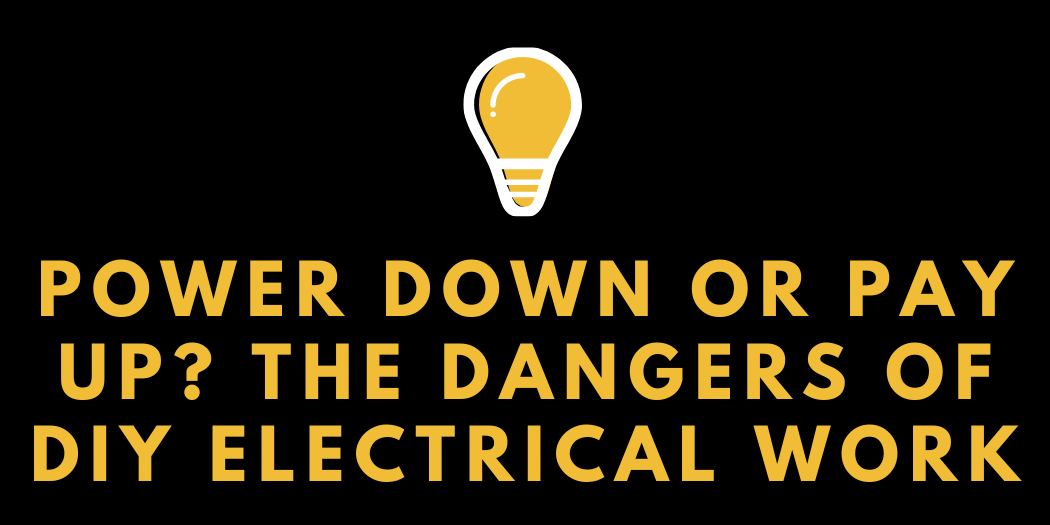Power Down or Pay Up? The Dangers of DIY Electrical Work
We’ve all been there. You stand in your home, staring at a flickering light or a dead outlet, and the ever-present urge to tackle the problem yourself whispers in your ear. After all, with a quick internet search and a trip to the hardware store, it seems simple enough, right? Wrong. While the internet is a fantastic resource, it can’t replace years of training and experience when it comes to electrical work. In this blog post, we’ll delve into the hidden dangers of DIY electrical projects and why calling a qualified electrician is always the smarter, safer choice.
The Shocking Truth: Electrical Work Isn’t for Amateurs
Electricity is a powerful force, quite literally. It keeps our lights on, our appliances running, and our lives comfortable. But in the wrong hands, it can be deadly. Each year, thousands of people are injured or killed due to electrical accidents, many of them stemming from DIY electrical work. Here’s a sobering breakdown of the risks involved:
-
Electrocution: This is the most serious consequence, and it can happen in an instant. Even a seemingly low voltage can disrupt your heart rhythm and cause severe injury or death.
-
Electrical Fires: Faulty wiring, overloaded circuits, and improper installations are all common culprits in electrical fires. These fires can spread quickly, causing significant damage to your property and putting your life and the lives of your loved ones at risk.
-
Hidden Hazards: Homes are full of hidden electrical wires and components. A seemingly simple task like installing a new light fixture could put you in contact with live wires you didn’t even know existed.
-
Long-Term Problems: Even if you manage to complete your DIY project without immediate incident, there’s a good chance you’ ve created hidden problems down the line. Faulty connections can overheat, causing damage to walls and insulation. Improper grounding can put you and your appliances at risk of shock.
Beyond the Dangers: The Downside of DIY Electrical Work
The dangers of DIY electrical work go beyond the immediate risks of shock and fire. Here are some additional factors to consider:
-
Building Codes and Permits: Electrical work is often subject to strict building codes. A qualified electrician will ensure your project meets all safety standards and obtain any necessary permits to avoid future complications.
-
Warranty Issues: Tampering with your home’s electrical system can void warranties on appliances and even your entire home.
-
Resale Value: Potential buyers may be wary of homes with unpermitted or shoddy electrical work.
When to Call a Licensed Electrician: Don’t Be a Hero
Let’s face it, there’s a reason electricians go through years of training and apprenticeship. Here are some clear signs it’s time to call a professional:
-
Anything beyond basic tasks: Replacing a light bulb or a switch is generally safe for most homeowners. However, anything that involves rewiring, installing new fixtures, or working with your breaker box should be left to the pros.
-
Sparks and Flickering: These are warning signs of a potentially dangerous issue. Don’t ignore them!
-
Burning Smells: The smell of burning plastic or rubber near electrical outlets or appliances is a serious fire hazard. Get everyone out of the house immediately and call an electrician.
-
Water Damage: Electricity and water don’t mix. If you’ve experienced any water damage near your electrical system, call an electrician to assess the situation.
The Value of a Qualified Electrician: Peace of Mind and Safety
So, you’ve decided to call in a professional. Great decision! Here’s what you can expect from a qualified electrician:
-
Expertise and Experience: A licensed electrician has the knowledge and experience to handle any electrical project safely and efficiently.
-
Safety First: Electricians prioritize safety above all else. They’ll use the right tools and follow proper safety procedures to minimize risk.
-
Code Compliance: They’ll ensure your project meets all local building codes and obtain any necessary permits.
-
Warranty on Work: Most electricians offer warranties on their work, giving you peace of mind.
-
Future Service: Having a reliable electrician on call for future repairs and maintenance needs is invaluable.
Invest in Your Safety: Don’t Gamble with Electricity
In the end, the decision of whether to tackle an electrical project yourself or call a qualified electrician comes down to a simple question: is saving a few bucks worth risking your safety and your home? We believe the answer is clear. Think of the peace of mind that comes from knowing your electrical system is safe and up to code. Consider the potential cost of repairs if a DIY project goes wrong.







